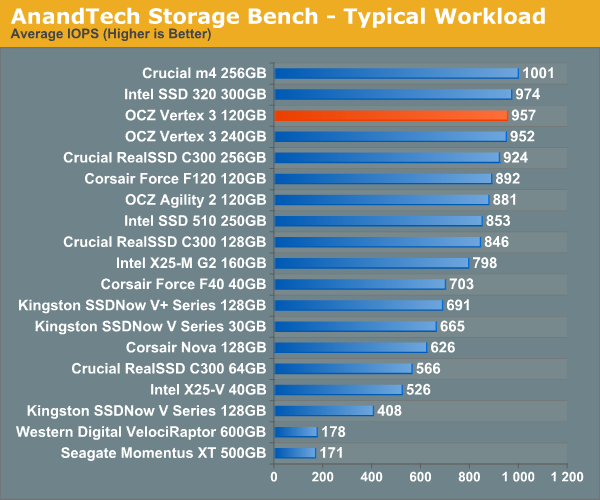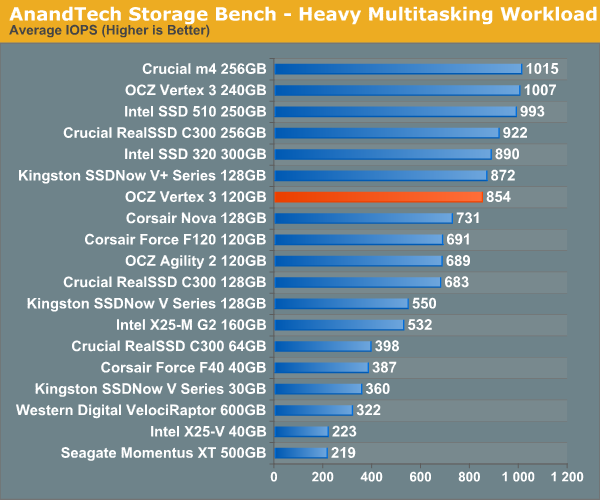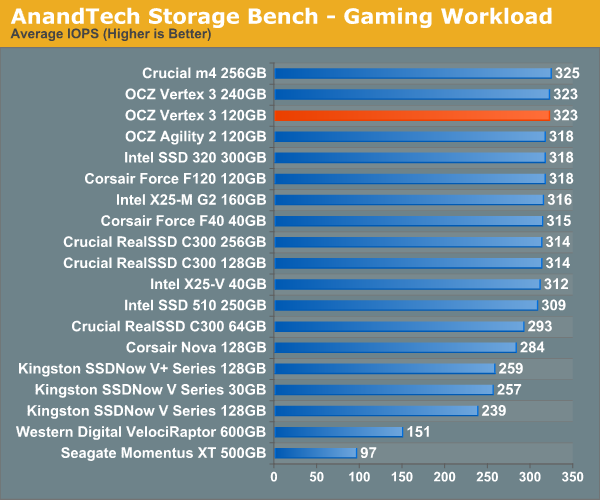The OCZ Vertex 3 Review (120GB)
by Anand Lal Shimpi on April 6, 2011 6:32 PM ESTAnandTech Storage Bench 2010
To keep things consistent we've also included our older Storage Bench. Note that the old storage test system doesn't have a SATA 6Gbps controller, so we only have one result for the 6Gbps drives.
The first in our benchmark suite is a light/typical usage case. The Windows 7 system is loaded with Firefox, Office 2007 and Adobe Reader among other applications. With Firefox we browse web pages like Facebook, AnandTech, Digg and other sites. Outlook is also running and we use it to check emails, create and send a message with a PDF attachment. Adobe Reader is used to view some PDFs. Excel 2007 is used to create a spreadsheet, graphs and save the document. The same goes for Word 2007. We open and step through a presentation in PowerPoint 2007 received as an email attachment before saving it to the desktop. Finally we watch a bit of a Firefly episode in Windows Media Player 11.
There’s some level of multitasking going on here but it’s not unreasonable by any means. Generally the application tasks proceed linearly, with the exception of things like web browsing which may happen in between one of the other tasks.
The recording is played back on all of our drives here today. Remember that we’re isolating disk performance, all we’re doing is playing back every single disk access that happened in that ~5 minute period of usage. The light workload is composed of 37,501 reads and 20,268 writes. Over 30% of the IOs are 4KB, 11% are 16KB, 22% are 32KB and approximately 13% are 64KB in size. Less than 30% of the operations are absolutely sequential in nature. Average queue depth is 6.09 IOs.
The performance results are reported in average I/O Operations per Second (IOPS):

If there’s a light usage case there’s bound to be a heavy one. In this test we have Microsoft Security Essentials running in the background with real time virus scanning enabled. We also perform a quick scan in the middle of the test. Firefox, Outlook, Excel, Word and Powerpoint are all used the same as they were in the light test. We add Photoshop CS4 to the mix, opening a bunch of 12MP images, editing them, then saving them as highly compressed JPGs for web publishing. Windows 7’s picture viewer is used to view a bunch of pictures on the hard drive. We use 7-zip to create and extract .7z archives. Downloading is also prominently featured in our heavy test; we download large files from the Internet during portions of the benchmark, as well as use uTorrent to grab a couple of torrents. Some of the applications in use are installed during the benchmark, Windows updates are also installed. Towards the end of the test we launch World of Warcraft, play for a few minutes, then delete the folder. This test also takes into account all of the disk accesses that happen while the OS is booting.
The benchmark is 22 minutes long and it consists of 128,895 read operations and 72,411 write operations. Roughly 44% of all IOs were sequential. Approximately 30% of all accesses were 4KB in size, 12% were 16KB in size, 14% were 32KB and 20% were 64KB. Average queue depth was 3.59.

The gaming workload is made up of 75,206 read operations and only 4,592 write operations. Only 20% of the accesses are 4KB in size, nearly 40% are 64KB and 20% are 32KB. A whopping 69% of the IOs are sequential, meaning this is predominantly a sequential read benchmark. The average queue depth is 7.76 IOs.











153 Comments
View All Comments
jharmon - Monday, May 2, 2011 - link
It's been almost a month since an update in the SSD world from Anandtech. Are there any reviews on the near horizon? You said one might want to wait for a purchase until you got some of the lower capacity drives in to test to compare with the vertex 3.Thanks for all your hard work in analysis, Anand!
jharmon - Monday, May 2, 2011 - link
Maybe also address the issue with the hardware limitation from the Marvell controllers 91xx. If I understand it correctly, these will be be able to achieve the 500 MB/s. If that performance cannot be achieved, is the vertex 3 worth the premium?mrkimrkonja - Wednesday, May 4, 2011 - link
From these SSD articles I learned that TRIM is very important with SSD.I read somewhere that when you use SSD in RAID you lose TRIM support and some other things.
Is this true?
I now have 2 old ADATA SSD generation 1 in RAID0 they have 2x the performance comparing to a single drive bud they do not have TRIM anyway.
I already bought one VERTEX 2 60GB and thought buying anther one.
Always thought better more smaller disks in RAID than one big one.
If this is true I an thinking I would lose more over time without TRIM support than gain with RAID0.
Can you hal me with some info or first hand tests?
Foochey - Wednesday, May 4, 2011 - link
I would be very interested to see how the 480GB stacks up to these drives. Since these are parallel processing devices, you would think that the 480 would perform even better than the 240. Anand, any way you can get a 480 and test it? OCZ's specs look the same, so I'm guessing that they are using the smaller die chips or doing something with the way they write to the array. Any ideas? Price certainly makes the 480 out of the question for most of us, but I sure would be interested in its performance.jeffburg - Thursday, May 26, 2011 - link
OCZ Just launched the Max IOPS Version. Is that worth the extra $10? Whats the difference between the two?Palen - Thursday, June 2, 2011 - link
Thank you for another great article.In the conclusion of this article it's advised to wait for a couple of weeks to see how the vertex 3 120 GB goes againts the other 3rd generation 120GB SSD's. Is there any indication that Anandtech will be recieving / testing any of these drives in the near future?
Another thing is RAID: I've been doing some digging on SSD's, since I didn't know much about them untill last week. The general picture is starting to make sence now. Bigger is ussually faster (within certain parameters). However i'm getting conflicting information about RAID. According to some it's worth it, while others urge to stay away from RAID (no TRIM support, etc). It would be nice to have a well respected opinion in the mass of conflicting information. How would for instance 2x 60 GB SSD's do against a same type/brand 120 GB SSD? and how does the raidcontroller fit into this equation? On-board vs. professional solution?
My gut says "stay away from raid!" because the SSD's allready scale in performance depending on their storagesize. Next to that the strain that an onboard controller will put on your CPU. And paying for a professional raidcard just seems silly, with the range of SSD PCIe storage solutions. But than again, what do I know?
paul-p - Saturday, October 22, 2011 - link
After 6 months of waiting for OCZ and Sandforce to fix their firmware from freezes and BSOD's, I can finally say it is fixed. No more freezes, no more BSOD's, performance is what is expected. And just to make sure all of the other suggestions were 100% a waste of time, I updated the firmware and DID NOT DO anything else except reboot my machine and magically everything became stable. So, after all these months of OCZ and Sandforce blaming everything under the sun including:The CMOS battery, OROM's, Intel Drivers, Intel Chipsets, Windows, LPM, Hotswap, and god knows what else, it turns out that none of those issues had anything to do with the real problem, which was the firmware.
While I'm happy that this bug is finally fixed, Sandforce and OCZ have irrepairably damaged their reputation for a lot of users on this forum.
Here is a list of terrible business practices that OCZ and Sandforce have done over the last year...
OCZ did not stand behind their product when it was clearly malfunctioning is horrible.
OCZ did not allow refunds KNOWING that the product is defective is ridiculous.
OCZ nor Sandforce even acknowledged that this was a problem and steadfastly maintained it only affected less than 1% of users.
The fact that OCZ claims this bug affected 1% of users is ridiculous. We now know it affected 100% of the drives out there. Most users just aren't aware enough to know why their computer froze or blue screened.
OCZ made their users beta test the firmwares to save money on their own testing
OCZ did not have a solution but expected users to wipe drives, restore from backups, secure erase, and do a million other things in order to "tire out" the user into giving up.
OCZ deletes and moves threads in order to do "damage control and pr spin".
But the worst sin of all is the fact that it took almost a year to fix such a MAJOR bug.
I really hope that OCZ learns from this experience, because I'm certain that users will be wary of Sandforce and OCZ for some time. It's a shame, because now that the drive works, I actually like it.
paul-p - Saturday, October 22, 2011 - link
I just want to thank Anandtech for being the ONLY site out there there called out OCZ and Sandforce for having defective products. While every other hardware site out there were kissing OCZ and Sandforces butt and saying that the Vertex 3 SSD was the best thing since sliced bread, Anandtech actually was one of the only sites that actually acknowledged that there was a major bug with the sandforce controllers.I can't believe all the review sites out there were praising the Vertex 3 for almost a year when the drive had major BSOD and freezing issues. A review should be more than running a benchmark on the drive, but checking to see how the drive performs and making sure it is stable. In my eyes, every other review site showed me that they care more about the sponsors and advertising dollars than the users that visit their site. So, once again, thanks Anandtech for speaking the truth when others wouldn't.
danwat12345 - Sunday, November 13, 2011 - link
I think I'll keep my 80GB Intel X25-m G2 SSD. From your benchmarks it looks like the 120GB Vertex 3 over SATA 2 isn't that much better with random read operations than my trusty ole' 80GB Intel.I am curious if your Anandtech storagebench 2011 test were done on completely in-compressible data? The random read numbers of the Vertex 3 120GB SATA2 drive wasn't very impressive.
chainspell - Saturday, December 10, 2011 - link
you had me at page 4...tell Alex Mei (the CEO) he has my business, I just bought 2 of these on Newegg!